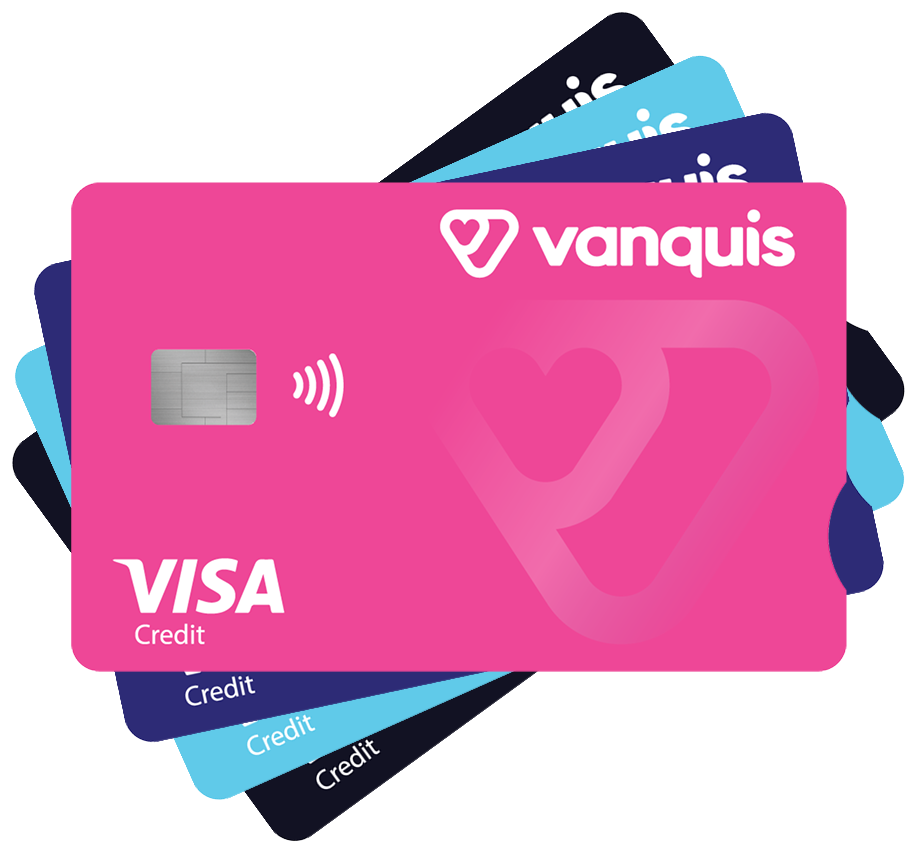What are credit card charges?
When thinking about a credit card, it’s important to be aware of the different fees and charges that could affect you.
Let us help you navigate the world of credit card charges so you can make an informed decision.


Credit card charges explained
Credit cards can be a great tool for managing your money, but they sometimes have extra fees. If you’re considering switching cards, it can be difficult to know which option is best for you.
That’s why we’ve created this guide to help you understand credit card fees and charges. Below, we’ll explain how they work and what to look out for when searching for your credit card.
Types of credit card charges
When exploring credit card charges, it’s important to know the different types. Depending on your usage, you may come across different fees.
Here are some key fees and charges to keep in mind:

Charges for late or missed payments
When you receive your credit card statement it will show the minimum payment amount and due date. If you miss this payment, you could face a late fee. This fee varies by provider but is often £10 or more.
Late payments could harm your credit report, and repeated late payments may make lenders cautious about approving future applications from you. Some lenders even limit the number of late payments a cardholder can make.
Missing payments entirely may cause serious damage to your credit score. If you’re worried about your finances, we encourage you to explore our money worries guidance for support.
Charges for withdrawing cash with a credit card
You can usually withdraw cash using your credit card with most providers. But be aware this often comes with a fee.
The fee is usually a percentage of the amount you withdraw, typically around 2%. This can add up quickly, especially with larger withdrawals.
Also, the interest on cash withdrawals is often higher than on regular credit card purchases.
It can be useful to use a debit card for cash withdrawals whenever possible to avoid extra costs.
Charges for using a credit card abroad
Some credit cards now offer free use abroad, but some providers still charge for non-sterling transactions. This applies to any payment made in a currency other than UK sterling, like euros or dollars.
When you buy something abroad, your card provider converts the foreign currency to sterling. In addition to a non-sterling transaction fee (normally around 2%), the exchange rate could be worse than at a supermarket or bureau de change before your trip.
If you withdraw cash abroad using your credit card, be aware you’ll likely incur a withdrawal fee and interest on the amount you take out.
Fees for transferring a credit card balance
A balance transfer credit card lets you move your credit card balance from your current card to a new one. This helps you avoid interest charges on your existing balance.
Depending on your credit score, some credit cards may offer a promotional period with no interest on your balance.
However, there’s usually a fee for this, typically a percentage of the amount you’re transferring. You should factor this in when considering a balance transfer.
Look out for promotional offers that might waive the fee or offer a lower charge, as this could save you money in the long run.
Fees for exceeding credit card limits
If you go over your agreed credit limit on your credit card, you could face a fee. This could be £10 or more.
To avoid this charge, you should contact your card provider in advance, if you think you’ll go over your limit. They may be able to offer a temporary credit limit increase to help you stay within your allowance.
This increase might not be permanent and could be denied, so it’s important to plan ahead for this possibility.
Ways to avoid credit card charges and fees
If you manage your credit card with care, you can avoid unnecessary charges. It can be helpful to pay off your full balance each month by the due date to avoid interest fees.
To make payments easier, consider setting up automated payments. Most credit card providers allow Direct Debit payments. This ensures you make your payments on time without needing to transfer money manually.
You can also opt for a recurring card payment, known as a ‘continuous payment authority (CPA)’, which takes the payment directly from your debit card.
It’s useful to schedule these payments for when you know you’ll have funds, for instance, right after you get paid.
It’s also a good idea to regularly check your payment due date. Setting calendar alerts or phone reminders can help make sure you never miss a payment.
Be mindful of other potential fees mentioned in this guide, like those for using your card abroad or withdrawing cash.
If you expect you’ll need to use your card in these situations, check for any related charges upfront. This way, you can make informed decisions based on any costs you may face.
Disputing incorrect charges
If you see incorrect charges on your credit card statement, contact your card provider’s customer service team as soon as possible so they can investigate right away. Most have a dedicated dispute process.
Explain the issue clearly, sharing any evidence you have, like receipts and transaction details. Your provider may ask you to submit a formal dispute in writing, so be prepared to follow up. You should keep records of all communications.
Under UK law, you have the right to challenge any unauthorised or incorrect charges. Your provider has to investigate your claim.
Credit card charges quick reference table
| Credit card fee | Description | Typical charge |
|---|---|---|
| Interest payment | The fee you incur if you don’t pay off your balance each month, unless you have a specific interest-free offer (for example, for balance transfers or purchases) | UK average APR: 35.7% |
| Late payment | A fixed fee if you fail to make the minimum monthly payment on your card balance | £12 – £25 |
| Over credit limit | A fixed fee charged if you exceed your credit limit | £12 – £25 |
| Annual usage | Cashback, rewards and perks cards often come with an annual fee. Some may waive this fee for the first year as an incentive to sign up | The average annual usage fee for credit cards in the UK varies widely depending on the card type and benefits offered. Normally, fees range from £0 to £200 |
| Cash machine withdrawals | Most credit cards charge fees for cash withdrawals and, unlike regular purchases, interest is typically applied immediately | 3% of the amount you withdraw, or a minimum of £3 |
| Balance transfer | A balance transfer credit card lets you move a balance from another card, but you’ll usually pay a percentage fee on the transfer | 2 – 4% of the amount you transfer |
| Overseas transactions | Most credit card providers charge a non-sterling transaction fee for each use abroad | 2.5– 3% of the transaction |
What are credit card surcharges?
Credit card surcharges are fees added by merchants for processing a payment, specifically because a credit card was used by the customer. Sometimes surcharges are added to some types of payment but not others. For example, a shop might charge extra to process card payments but process cash payments without a surcharge.
Since 2018, traders in the UK are prohibited from surcharging the use of credit cards, and in most circumstances, shops should not charge customers extra for their method of payment. If you’re charged extra for using a credit card, you may be entitled to a refund for any unlawful surcharges.
Featured article
When were credit cards invented?
What Are the Different Types of Credit Card?
What are Credit Card Interest Rates?
Credit Card Minimum Payments
What is a Secured Credit Card?
Frequently Asked Questions
How do I avoid credit card fees?
To avoid credit card fees and interest charges, it’s useful to pay your balance in full each month. It may help to automate payments for the minimum amount due (for example, by setting up a Direct Debit). You can also avoid cash withdrawals and check for foreign transaction fees when using your card abroad. Some credit cards offer introductory 0% interest periods, or advertise they charge no annual fees, so it’s worth shopping around for the card that best suits your needs.
Is there a cost to using a credit card?
Using a credit card may incur costs. Common charges include interest on unpaid balances, annual fees, late payment fees and cash withdrawal fees. Additionally, foreign transaction fees may apply when using your card abroad. Understanding these costs is useful for managing your finances effectively.
Does a credit card charge for every transaction?
Credit cards usually don’t charge for every transaction. Most everyday purchases incur no fees if you pay the balance in full by the due date. However, fees may apply for things like cash withdrawals, foreign transactions or if you exceed your credit limit. It’s important to always check your card’s terms and conditions for specific charges.
Is it normal to make monthly payments when you have a credit card?
Yes, it’s normal to make monthly payments on a credit card. Cardholders will need to pay at least the minimum payment each month. Paying your balance in full each month helps avoid interest charges, while paying only the minimum can increase debt.
Vanquis Credit Cards
Check out our selection of Vanquis credit cards, designed to help you manage unexpected expenses and build your credit.
Easily check your eligibility for all our cards with our free tool, allowing you to explore your options without affecting your credit score.
Find the ideal credit card for you and get the support you need to manage your spending today.
Representative 42.9% APR (variable)

More from Matt
View all articles
How to switch credit cards
How do you switch to a new credit card? Is switching credit cards the right option for me? What are the pros and cons of switching? Learn more in our article....

How to pay off credit card debt
Want to reduce credit card debt? Learn how to reduce credit card debt with smart budgeting, payment strategies, and tips to take control of your finances....

What is adverse credit?
What is a personal adverse credit history? How does this impact your ability to get a credit card, loan or mortgage? What causes adverse credit? We answer these questions and more....

What Are the Different Types of Credit Card?
What are the different credit card types? Learn more in our detailed guide about balance transfer cards, money transfer cards, credit builder cards and more....

What are Credit Card Interest Rates?
When thinking about a credit card, it's important to be aware of the different fees and charges that could affect you. Let us help you navigate the world of credit card charges so you can make an informed decision....